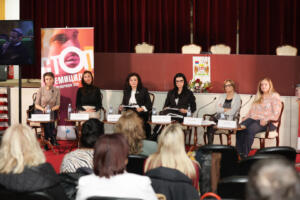Belgrade, 21 December 2023 – The Ministry of Human and Minority Rights and Social Dialogue carried out the “Stop Femicide” Campaign. The campaign included five panel discussions and aimed to raise awareness of the problem of femicide in Serbia. The discussions were organized in the cities of Belgrade, Kragujevac, Novi Sad, Nis and Novi Pazar, within the Project of the German Development Cooperation “Support to social inclusion in Serbia”, implemented by the Deutsche Gesellschaft für Internationale Zusammenarbeit (GIZ) GmbH. The discussions were attended by representatives of all parts of society, of the Government, civil society organisations, the private sector, the media and individual participants. The panellists announced the adoption of legislative amendments to help remove the obstacles that usually exist in court proceedings and in relation to the rights of the victims of violence, which are often subordinated to the rights of the perpetrators. The Ministry’s initiative to categorize femicide as the most serious crime was supported, as 27 women were killed by men this year. It is estimated that 300 women have been killed by men in the last 10 years.

One of the conclusions of the panels was that it was necessary to establish standard operating procedures that would allow all victims to receive the same treatment, as this is not currently the case in Serbia. Experiences of the representatives of local self-governments show that a large number of cases are not completed because the victims give up at the beginning or during the court process, because individuals from the justice system and the defendants, with their approach and behaviour, repeatedly victimize the victim of violence. Having that in mind, the message was sent from all panel discussions in Serbia, that it is necessary to work more intensively on a system which would make it possible, with its effectiveness and impartiality, to encourage the victims to report violence and to participate in the court process. This emphasises the need for further radical reform of the social protection system and the education system. The participants also emphasised the importance of educating society as a whole and young people in particular, as they need to be sensitised to violence and protect victims rather than be new perpetrators. In this context, the importance of the family and the school system was emphasised.

The panellists and individuals also emphasised the need to work on women’s economic independence, as this would help to break the chain of violence and contribute to their long-term care through local self-governance. Furthermore, the participants appealed that it is necessary to enable children to become visible in the process of combating violence, as they are also victims and the system does not treat them as such or recognise them as victims.
The panellists also shared personal experiences that contributed to a better understanding of the role of the victim, the roots of misconceptions about women’s rights and the benefits and limitations of the existing legal framework in preventing violence against women.

The difficult situation of women living in rural areas was pointed out because there are no safe houses for them. The complicated situation faced by women with disabilities who are victims of violence was also highlighted, as in many cases they are dependent on the perpetrators when it comes to receiving therapy or managing their daily lives. It was explained that the law does not recognise the situation in which the victim is also dependent on the perpetrator. It was suggested that the changes should go in the direction of providing the necessary accommodation or a personal assistant in certain cases. The panels also discussed women living in shared households, especially Roma women and women from rural areas, who suffer from violence. In most cases, these women are still victims even after the perpetrator has moved out of the family home, as they then suffer from the violence perpetrated against them by his parents and family members with whom they live in the same household.
Femicide is a complex phenomenon that is widespread throughout the world and knows no borders, race, class, culture, tradition or religion. For this very reason, it requires the joint efforts of all sectors of society, while continuous joint programmes and efforts to prevent and combat femicide are important to prevent and resolve cases of domestic violence and gender-based violence against women.








